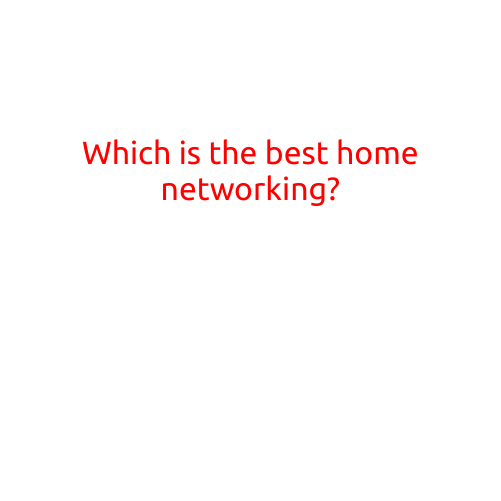
Which is the Best Home Networking?
In today’s digital age, a reliable and efficient home networking system is no longer a luxury, but a necessity. With the increasing number of devices and users in a typical home, a good home networking system can make all the difference in terms of speed, performance, and overall user experience. But with so many options available, it can be overwhelming to choose the best one for your needs.
In this article, we will explore the different types of home networking systems, their pros and cons, and help you make an informed decision about which one is right for you.
Home Networking Options
There are several types of home networking systems available, each with its own set of features, benefits, and limitations. Some of the most common options include:
- Wired Ethernet: This is the traditional home networking method that uses physical cables to connect devices to a router or modem. Wired Ethernet is fast, reliable, and secure, but it can be cumbersome and expensive to install.
- Wi-Fi: Wi-Fi is a popular wireless networking option that allows devices to connect to the internet without the need for cables. Wi-Fi is convenient, flexible, and easy to install, but it can be slower and less secure than wired Ethernet.
- Mesh Networking: Mesh networking is a newer technology that uses multiple access points to create a network of interconnected hotspots. Mesh networking is ideal for large homes or homes with many devices, as it provides strong and reliable coverage.
- Powerline Networking: Powerline networking uses the electrical wiring in your home to transmit data between devices. Powerline networking is an alternative to wired Ethernet and Wi-Fi, but it can be slower and affected by electrical interference.
- Coaxial Networking: Coaxial networking uses coaxial cables to transmit data between devices. Coaxial networking is fast and reliable, but it is limited to short distances and requires specialized equipment.
Things to Consider When Choosing a Home Networking System
When choosing a home networking system, there are several factors to consider, including:
- Speed: How fast do you need your network to be? If you have multiple devices and users, you may need a faster network to support high-bandwidth activities like streaming and online gaming.
- Coverage: How large is your home, and how many devices do you need to connect? You may need a network that provides strong and reliable coverage throughout your home.
- Security: How important is security to you? A secure network is essential for protecting your devices and data from hackers and cyber threats.
- Easy of Use: How user-friendly do you need your network to be? If you’re not tech-savvy, you may prefer a network that is easy to set up and manage.
- Cost: What is your budget for a home networking system? You may need to consider the cost of equipment, installation, and maintenance.
Conclusion
Choosing the best home networking system can be a daunting task, but by considering your needs and preferences, you can make an informed decision. Whether you opt for wired Ethernet, Wi-Fi, mesh networking, powerline networking, or coaxial networking, it’s essential to choose a system that provides fast, reliable, and secure connectivity for all your devices and users.
Recommendations
Based on our research and analysis, we recommend the following home networking systems:
- For small homes with limited devices, a wired Ethernet or Wi-Fi system may be sufficient.
- For larger homes with many devices, a mesh networking system with multiple access points is recommended.
- For homes with specific security requirements, a powerline networking system with advanced security features may be the best option.
- For homes with a large number of devices and users, a coaxial networking system with high-speed data transfer rates may be the best choice.
Ultimately, the best home networking system for you will depend on your specific needs and preferences. We hope this article has provided valuable insights and recommendations to help you make the right decision for your home.





